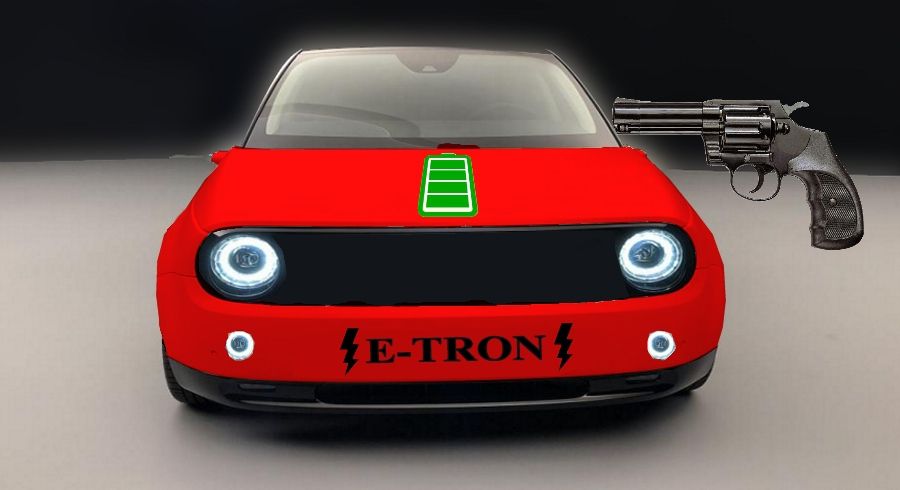WORLD AUTOMOBILE
THE ELECTRIC CAR "A COLLECTIVE SUICIDE"? | |
But with big changes: half of the manufacturers present, or almost, are now Chinese. This year, no BMW, Opel or Mercedes, supplanted by BYD, Ora or Seres. A sign of the times, Chinese manufacturers are surfing on electrics and showcasing European brands. Premium and electric, they highlight safety in an attempt to attract French customers. For these brands from China, exhibiting at the Porte de Versailles is the first stage of a vast European offensive, launched after many years of preparation by Beijing. In fact, French industry is in transition and in crisis, demand is falling, production in France has continued to decline and manufacturers no longer need major events to win over customers who can be won over through smartphones. Whether it's its accessibility or its manufacture, the EV is not the miracle solution. By setting itself the objective of banning the sale of combustion engine vehicles from 2035, the European Union has put pressure on an entire sector, which must now deal with an injunction which may make sense from an environmental point of view, but whose milestones remain unclear. But going electric raises more questions than it answers. Accessibility, first. Manufacturers estimate that it will take between five and seven years to reduce the price difference between a thermal vehicle and its electric equivalent. In the meantime, the number of potential buyers threatens to collapse. Emmanuel Macron announces future aid so that the most modest households can buy an electric car. The president has just announced an increase in the purchase premium, which for the most modest households will increase from 6,000 to 7,000 euros. In addition, the idea of setting up a subsidized rental system with an option to purchase at 100 euros is proving more complicated than expected. It is also difficult to know which models will be eligible for future leasing: the Dacia Spring, the most accessible new electric car in France at the moment, is also assembled in China. Despite these aids, the EV will remain out of reach for many French people. And if more than a million are already driving on our roads, EVs represent barely 2% of the total fleet. In addition, the goal will be difficult to achieve because our Chinese competitors in particular already have a head start. Eight out of ten electric cars sold in France are imported. This is why Bruno Le Maire insists on the need for public aid targeting vehicles produced in Europe, including batteries, like what is in place in China or the United States. "We don't want to finance foreign builders," says Bruno Le Maire. Carlos Tavares, the boss of Stellantis also regrets the lack of European protectionism against Chinese electric cars. Emmanuel Macron to ask that Europe, like the United States, put in place aid that plays the card of preference for made in Europe. A form of limited and intelligent protectionism. What about technology ? Only one in four French people believe in the advent of all-electric in 2035. The rate of installation of charging stations is not likely to reassure them. Of the 100,000 promised by the public authorities, barely three quarters have been installed, many of which are out of order due to lack of maintenance. Without an acceleration of investments in this area and an improvement in the autonomy of vehicles, the use of the EV will have difficulty in becoming widespread. Obviously the Head of State also announces that he will facilitate the deployment of electric terminals and to prevent the price of recharging from exploding, he proposes that they be, like households, protected by the tariff shield What about the industrial consequences of the transition ? Half of the value chain is still located in Asia. In addition, Europe must import the main components needed to manufacture batteries, the prices of which are exploding. If the French manufacturers try to accelerate to locate the assembly in their factories, nothing says that they will win the race against the clock engaged with Chinese competitors, who are ready to sweep on the Old Continent with cars which cost 20% to 30% cheaper. While Stellantis has just announced that six new electric vehicles in France, Bruno Le Maire calls on French manufacturers to continue to relocate to France. With the efforts in terms of industrial competitiveness, a small vehicle like the Peugeot 208 "must again be produced in France", presents the minister. The government is counting on 2 million electric cars produced in France "in the coming years" (about 11 times more than currently), recalls Bruno Le Maire. During a round table on the theme "Sustainable mobility, mobility of the future", Bruno Le Maire also argues "that we must continue to fight for a carbon-free electric battery" For the minister, the production of "carbon-free" batteries in France is an essential step in the electrical transition. With both a commercial interest, to no longer be dependent on Chinese batteries, and of course environmental, so that the electric car is really a tool in the fight against global warming... The planet in turbulence “If you liked 2020, 2021 and 2022, you will love the next 10 years: there will be a lot more turbulence and crises!”, says Christophe Périllat. For the boss of Valeo, the electric transition will notably contribute to the galloping inflation of the coming years. "Turbulences" which are linked to the transformation to be carried out... Enough jokes. Beyond the blissful optimism displayed by Emmanuel Macron at the Paris Motor Show, let's dive into the book Electric Car: They've Gone Crazy!, by François-Xavier Pietri, former editor-in-chief of La Tribune, denouncing a " dictatorship" against the EU-led combustion car. "He chose Victor Hugo to illustrate his state of mind: "When the dictatorship is a fact, the revolution becomes a right." What "dictatorship" does he denounce ? The decision taken by the European Union to stop the sale of new combustion vehicles from 2035 generalizing battery-powered cars. For the author, this decision, which he describes as a "diktat", is a collective suicide. |
|
| Tom Morgan for DayNewsWorld | |
 |
|




